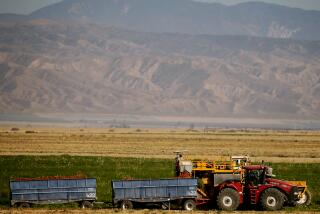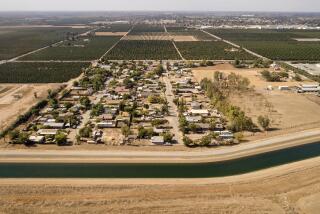America’s Farmer Fields Media : Drought: A humble cotton grower emerges as the unofficial spokesman in fight to get state water for San Joaquin Valley crops.
- Share via
SHAFTER, Calif. — Catchy quotes and snappy sound bites can be hard to find, but they seem to tumble right out of Fred Starrh. Perhaps that explains why Starrh, an ordinary Kern County cotton grower for most of his adult life, has suddenly become America’s Farmer, the virtual embodiment of agriculture’s suffering in the fifth year of the California drought.
Maybe you’ve heard of this man. These days, he’s hard to miss.
On top of being interviewed by nine major newspapers and the Associated Press, Starrh, 61, has appeared prominently on all three television networks and CNN. Both Time and Newsweek sought him out, as did National Public Radio, the syndicated Rush Limbaugh show and a bushel of small-town journalists.
All of this since February.
“It’s been kinda crazy,” Starrh mused recently in a soft, down-home drawl that has won him the hearts of TV newscasters coast to coast. “The politicians around here all want to know who my press agent is.”
Editors at the Progressive Farmer, a national magazine, apparently are wondering the same thing. In the April issue, under an item headlined “Starrh Quality,” they list excerpts from assorted publications, report that the state has “80,000 quotable” growers and observe: “You would think Fred Starrh is the only farmer in California.”
For Starrh, an indefatigably genial man whose balding head is always crowned with a spotless cap, the relentless attention has been a bit unsettling. Truth be told, this farmer would rather be out in his field west of Shafter, coaxing cotton out of the hard brown San Joaquin Valley earth.
But Starrh has no water this year, so for the first time in as long as he can remember, he can’t plant. As a result, there isn’t much to do.
“I used to get up (to watch) the 5 a.m. crop report, but there’s not much point any more,” Starrh says wistfully as he pokes the toe of a worn boot through the crust of his now-barren land. “I may as well talk to the press. . . . Maybe by speaking out, I can do some good.”
The seeds of Starrh’s metamorphosis into a media magnet were sown in early February, when the State Water Project announced it would not deliver any water to its agricultural customers this year. Starrh and neighboring farmers in western Kern County--an area totally dependent on water funneled south by the state’s aqueduct--had evaded the drought until then. Suddenly, it was at their door.
A swarm of reporters, looking to chronicle the toll that the water crisis was taking in California’s most vulnerable farm belt, soon descended on the valley, a vast, flat territory rich in cotton, alfalfa and almond crops. When they asked around for sources, fingers invariably pointed to Fred Starrh.
It’s easy to see why. Tall, humble and partial to red plaid shirts, Starrh looks like he’d be right at home behind the wheel of a cotton picker. He is plain-spoken but articulate. He is opinionated but not shrill.
What’s more, he has a true tale of woe to tell. The California Aqueduct flows right by his parched land, but the state says he can’t take a drop. He has scrounged enough water from local sources to keep his almond trees alive, but losing the year’s cotton crop forced him to lay off 40 longtime employees.
He’s having troubles with his banker and confides that sometimes “it gets to a point where you almost want to just shut it down and get out.”
For journalists seeking to attach a human face to the drought story, Fred Starrh seems made to order.
“Fred’s a natural” media hero, says Thomas Clark, general manager of the Kern County Water Agency, where Starrh serves on the board of directors.
“He just presents the facts and gets on with it,” adds Clayton Camp, who owns a farm machinery business near Buttonwillow and has known Starrh for almost 30 years. “He doesn’t over-dramatize or get too emotional.”
A second-generation farmer, Starrh has lived for all but the first six years of his life in Shafter, a sleepy place dubbed “Agricultural Paradise” by a giant wooden sign that welcomes visitors.
While four of his five siblings trooped off to college, Starrh remained on the 35-acre homestead. “I wasn’t academically inclined,” he recalls. Besides, “I was the type who knew he wanted to farm from the time he was a little guy.”
Working the farm--it was mostly cotton and chickens back then--and raising four kids ate up the bulk of Starrh’s energy in the early years. But as time passed and the business prospered, he made room for the local water and school boards, the county farm bureau and a few cotton industry groups. Plaques covering a wall of his home reveal an impressive collection of honors, among them, Shafter’s “Ag Man of the Year” in 1976 and “Citizen of the Year” six years later.
“I try to stay involved in the community,” Starrh says. “I believe you should do that sort of thing.”
Nothing, however, prepared him for life as a one-man media event. Since the state water spigot was turned off in February, the telephones in his home, office and Oldsmobile have been alive with queries from Arizona, New York, Sacramento. Can you tell me, one reporter after another inquires, about this drought?
“I can’t remember (which reporter) called first,” Starrh says over coffee at JD’s Country Cooking, a favorite haunt of Shafter’s farm fraternity. “One or two came out to talk, and then it just built on itself. It’s amazing.”
Amazing, but not unprecedented. Indeed, Starrh’s fate says a lot about journalists and their tendency to follow the leader. Once his comments and picture hit the wires, Starrh was viewed as a sure thing by reporters struggling to bring the drought to life--and meet their deadline.
For the most part, Starrh rates his experiences with the press as positive. The reporters were “pretty well informed,” he says, and “seemed more sympathetic” to the farmers’ plight than he expected.
Among the highlights was an interview for NBC’s “Today” show. Although he had to rise at 3:30 a.m., drive out to his fields and brave the morning chill to accommodate the program’s Eastern Time schedule, Starrh recalls that “I got my points across pretty good, and Joe Garagiola seemed like a really nice guy.”
On the negative side, Starrh believes he was “exploited” by a CNN crew who came to his home, interviewed and upset his wife, Nancy, then aired what he described as highly personal footage.
“They wanted emotion, and they got it,” Starrh says bitterly, his voice rising in anger as he recalled the episode. “I think we’ve been pretty generous with our attitudes and our time and they just took advantage of us. They just took advantage.”
In addition to filling a scrapbook with news clippings, the relentless media exposure has made Starrh a target of entrepreneurs offering miracle solutions to his water predicament. There have been calls from promoters of moisture-enhancing polymers that can be added to the soil, and others from water vendors in wetter parts of the West.
“There was one fella who called from Oregon who had some water to sell me,” Starrh recalls. “He said it was only 200 miles from his place to the Feather River. . . . I don’t know how he planned to get it there.”
Living in the limelight has also subjected Starrh to some ribbing from neighbors and colleagues in Shafter, where the sight of a TV news crew is about as a rare as a cool breeze in August.
“I have a good friend on the (Kern County) Board of Supervisors and he’s always giving me a hard time, asking me what my secret is,” Starrh says with a broad smile. “Some people think I’m trying to aggrandize myself, but I’m not.”
He is, however, trying hard to communicate a message from rural California. The drought, Starrh declares, should serve as a wake-up call for the state--a warning that the water supply system is unreliable and must be expanded.
“Farmers can’t go on like this, floundering around and not knowing whether they’re going to have water from year to year,” he says. “I was hopeful that this crisis would convert things to a more positive posture. But with all the rain (in March), people seemed to lose interest. I just don’t know if the political will is there to solve this problem.”
Even so, Starrh plans to continue his media appearances as long as people are interested:
“To me, we’re at war and we’re losing, and somehow we’ve got to do something to get into the battle. . . . I learned long ago that nothing happens if you complain to your neighbor out in the corner of the field. Maybe by going through the media, I can have an effect.”
More to Read
Sign up for Essential California
The most important California stories and recommendations in your inbox every morning.
You may occasionally receive promotional content from the Los Angeles Times.










